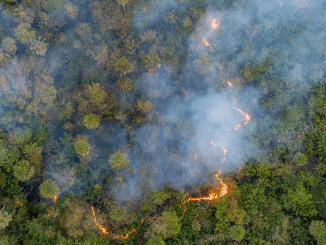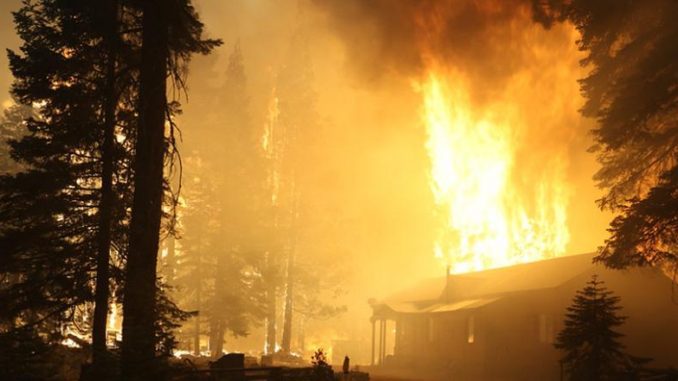
GENEVA, Switzerland, August 9, 2021 (ENS) – Climate change is widespread and rapidly intensifying, and some of the changes already in motion, such as continued sea level rise, are irreversible over hundreds to thousands of years, finds the latest report from the Intergovernmental Panel on Climate Change, IPCC, released today.
The IPCC Working Group I report, “Climate Change 2021: the Physical Science Basis,” was approved Friday by 195 member governments of the IPCC, through a virtual approval session held over two weeks starting on July 26. This report is the first installment of the IPCC’s Sixth Assessment Report, set for completion next year.
Human-induced climate change is already affecting many weather and climate extremes in every region across the globe, the new report sets forth in great detail. Scientists are observing changes across the whole of Earth’s climate system – in the atmosphere, in the oceans, ice floes, and on land.
Prepared by 234 scientists from 66 countries, the report concludes that human influence has warmed the climate at a rate that is unprecedented in at least the last 2,000 years.
In 2019, atmospheric concentrations of the greenhouse gas carbon dioxide (CO2) were higher than at any time in at least two million years, and concentrations of methane and nitrous oxide were higher than at any time in the last 800,000 years.
Global surface temperature has increased faster since 1970 than in any other 50-year period over a least the last 2,000 years. For example, temperatures during the most recent decade (2011–2020) exceed those of the most recent multi-century warm period, around 6,500 years ago, the report indicates.
Meanwhile, the global mean sea level has risen faster since 1900 than over any preceding century in at least the last 3,000 years.
The Working Group I assessment is based on improved data on historical warming, as well as progress in scientific understanding of the response of the climate system to human-caused emissions.
We Still Have Time – If We Act Now
Strong and sustained cuts in emissions of CO2 and other greenhouse gases could quickly make air quality better, and in 20 to 30 years global temperatures could stabilize, IPCC scientists say.
“It has been clear for decades that the Earth’s climate is changing, and the role of human influence on the climate system is undisputed,” said IPCC Working Group I Co-Chair, climate scientist Valérie Masson-Delmotte of France. She is research director at the French Alternative Energies and Atomic Energy Commission, where she works in the Climate and Environment Sciences Laboratory.
“Yet the new report also reflects major advances in the science of attribution – understanding the role of climate change in intensifying specific weather and climate events,” Masson-Delmotte said.
Stabilizing the climate will require strong, rapid, and sustained reductions in greenhouse gas emissions, and reaching net zero CO2 emissions. Limiting other greenhouse gases and air pollutants, especially methane, could have benefits both for health and the climate,” IPCC Working Group I Co-Chair climate scientist Panmao Zhai, secretary general of the Chinese Meteorological Society.
Today, the United States joined the other 194 IPCC member governments in approving the Working Group I report. “The Intergovernmental Panel on Climate Change’s (IPCC) newest report makes it clear – climate change is already a crisis,” said U.S. Secretary of State Antony Blinken.
“Most importantly, the report finds we are already edging closer to a 1.5 degrees Celsius warmer world, and every day emissions rise the prospects for averting the worst impacts of climate change become dimmer. This is why it is essential that all countries – in particular the major economies – do their part during this critical decade of the 2020s to put the world on a trajectory to keep a 1.5 degrees Celsius limit on warming within reach,” Blinken said.
“This is why the United States has committed to a 50-52 percent reduction in emissions from 2005 levels in 2030 and is marshaling the entire federal government to tackle the climate crisis,” he said.
This report is a call to action,” said U.S. Congresswoman Eddie Bernice Johnson, a Texas Democrat who chairs the House Committee on Science, Space, and Technology.
“We have known for decades the dangers of unmitigated greenhouse gas emissions, but this report is the strongest wake-up call yet. Humans are the driving force of warming, the impacts of climate change are already here, and if we don’t come together as a global community to invest in innovative ways to drastically decrease emissions, the impacts will be devastating,” Johnson said. “The science here is clear. We must act now.”
‘Code Red for Humanity’
UN Secretary-General António Guterres said the Working Group’s report is nothing less than “a code red for humanity.”
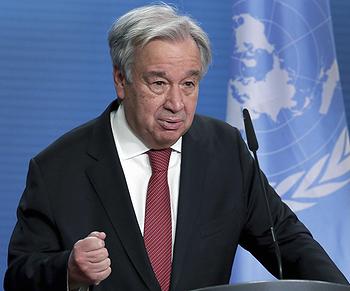
“The alarm bells are deafening, and the evidence is irrefutable,” he warned.
Guterres said the internationally-agreed threshold of 1.5 degrees above pre-industrial levels of global heating was “perilously close.”
“We are at imminent risk of hitting 1.5 degrees in the near term,” he said. “The only way to prevent exceeding this threshold, is by urgently stepping up our efforts, and persuing the most ambitious path. We must act decisively now, to keep 1.5 alive.”
The UN chief said that solutions are clear. “Inclusive and green economies, prosperity, cleaner air and better health are possible for all, if we respond to this crisis with solidarity and courage,” he said.
Ahead of the crucial United Nations COP26 climate conference in Glasgow in November, all nations, especially the advanced G20 economies, need to join the net-zero emissions coalition, and reinforce their promises on slowing down and reversing global heating, “with credible, concrete, and enhanced Nationally Determined Contributions” that lay out detailed steps,” said Gutteres.
The IPCC report shows that emissions of greenhouse gases from human activities are responsible for approximately 1.1°C of warming between 1850 and 1900, and the report finds that, averaged over the next 20 years, global temperature is expected to reach or exceed 1.5°C of heating since pre-industrial levels.
The IPCC scientists warn that global warming of 2°C above pre-industrial levels will be exceeded during the 21st century.
Unless rapid and deep reductions in carbon dioxide and other greenhouse gas emissions occur in the coming decades, the report warns that achieving the goals of the 2015 Paris Agreement “will be beyond reach.”
Helen Mountford, vice president, climate and economics, World Resources Institute, said, “If this IPCC report doesn’t shock you into action, it should.”
“The report paints a very sobering picture of the unforgiving, unimaginable world we have in store if our addiction to burning fossil fuels and destroying forests continues,” Mountford said. “One of the most striking takeaways is that we may reach 1.5°C of warming a decade earlier than the IPCC had previously found.”
Extreme Changes Everywhere
The IPCC scientists reveal that human activities affect all major climate system components, with some responding over decades and others over centuries.
Scientists also point out that evidence of observed changes in extremes such as heatwaves, heavy precipitation, droughts, and tropical cyclones, and their attribution to human influence, has strengthened.
They say that many changes in the climate system become larger in direct relation to increasing global warming – increases in the frequency and intensity of heat extremes, marine heatwaves, and heavy precipitation; agricultural and ecological droughts in some regions; the proportion of intense tropical cyclones; as well as reductions in Arctic sea ice, snow cover and permafrost.
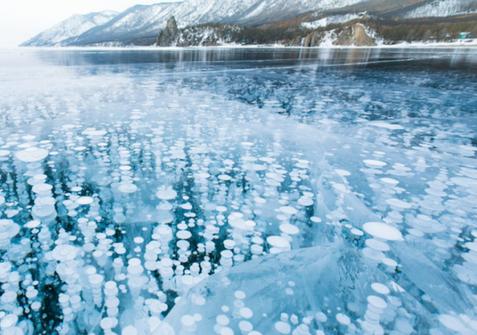
The report makes clear that while natural drivers will modulate human-caused changes, especially at regional levels and in the near term, they will have little effect on long-term global warming.
The IPCC scientists project that in the coming decades climate changes will increase in all regions. For 1.5°C of global warming, there will be increasing heat waves, longer warm seasons and shorter cold seasons.
At 2°C of global warming, heat extremes are more likely to reach critical tolerance thresholds for agriculture and health.
But it won’t be just about temperature. Climate change is intensifying the natural production of water – the water cycle. This brings more intense rainfall and flooding, as well as more intense drought in many regions.
It is also affecting rainfall patterns. In high latitudes, precipitation is likely to increase, while it is projected to decrease over large parts of the subtropics. Changes to monsoon rain patterns are expected, which will vary by region.
Coastal areas will see continued sea level rise throughout the 21st century, contributing to more frequent and severe coastal flooding in low-lying areas and coastal erosion.
Extreme sea level events that previously occurred once in 100 years could happen every year by the end of this century, the report warns.
Further warming is expected to amplify permafrost thawing, and the loss of seasonal snow cover, melting of glaciers and ice sheets, and loss of summer Arctic sea ice.
Changes to the ocean, including warming, more frequent marine heatwaves, ocean acidification, and reduced oxygen levels, affecting both ocean ecosystems and the people that rely on them, will continue throughout at least the rest of this century.
Experts warn that for cities, some aspects of climate change may be magnified, such as heat, flooding from heavy precipitation events, and sea level rise in coastal cities.
Furthermore, IPCC scientists caution that low-likelihood outcomes, such as ice sheet collapse or abrupt ocean circulation changes, cannot be ruled out.
Multiple, recent climate disasters including devastating flooding in central China and western Europe have focused public attention as never before, suggested Inger Andersen, executive director of the UN Environment Programme, UNEP.
“As citizens and as businesses and as governments, we are well aware of the drama,” Andersen said. “The drama exists, we have seen it and we heard about it in every news bulletin. And that’s what we need to understand, that the expression of what the science says is exhibited before our very eyes.”
“Of course,” said Andersen, “what this excellent report does is, it projects those scenarios outward, and tells us, if we do not take action, what could be the potential outcomes, or if we do take action, what will be a very good outcome.”
Climate Adaption, Mitigation Critical
Apart from the urgent need for climate mitigation, “it is essential to pay attention to climate adaptation,” said Peteri Taalas, executive director of the World Meteorological Organization “since the negative trend in climate will continue for decades and in some cases for thousands of years.”
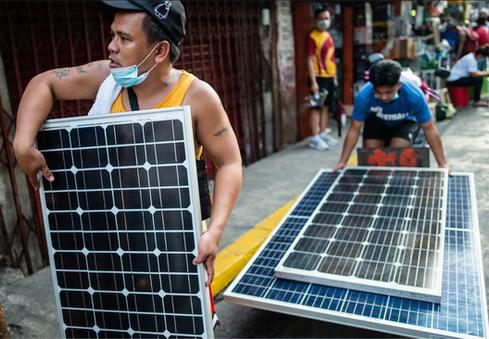
“One powerful way to adapt is to invest in early warning, climate and water services,” he said.”Only half of the 193 members of WMO have such services in place, which means more human and economic losses. We have also severe gaps in weather and hydrological observing networks in Africa, some parts of Latin America and in Pacific and Caribbean island states, which has a major negative impact on the accuracy of weather forecasts in those areas, but also worldwide.
“The message of the IPCC report is crystal clear: we have to raise the ambition level of mitigation,” Taalas said.
The report explains that from a physical science perspective, limiting human-induced global warming to a specific level requires limiting cumulative CO2 emissions, reaching at least net-zero CO2 emissions, along with strong reductions in emissions of other greenhouse gases.
“Strong, rapid and sustained reductions in methane emissions would also limit the warming effect resulting from declining aerosol pollution,” IPCC scientists state.
Carlos Manuel Rodriguez, CEO and Chair of the Global Environment Facility, the largest multilateral trust fund supporting implementation of international environmental conventions including on climate change, said, “I feel both alarmed and emboldened by the latest IPCC report, which shows that climate change is occurring much more quickly and with more extreme effects than we previously anticipated. We will realistically see temperatures by 2030 that scientists used to think might happen by 2040 in a worst-case scenario.”
“The tragedy of forest fires burning all over the world this year has shown us just how damaging rising temperatures can be for human life and nature. Changing this story for ourselves, our children, and our grandchildren is the most important thing we can do,” Rodriguez said.
The Intergovernmental Panel on Climate Change, IPCC, is the United Nations body for assessing the science related to climate change. It was established by the UN Environment Programme and the World Meteorological Organization in 1988 to provide political leaders with scientific assessments concerning climate change, its implications and risks, as well as adaptation and mitigation strategies. It has 195 member states.
Featured image: The Dixie Fire in California is the largest currently burning in the United States. August 4, 2021 (Photo courtesy CALFIRE)



